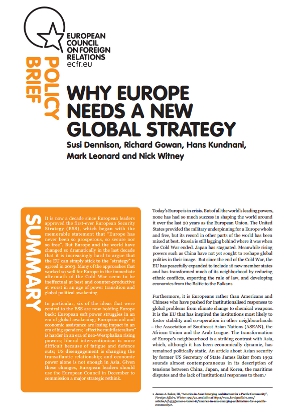Europe’s strategic deficit
At their end-year summit, Europe’s 28 national leaders will take time out from their interminable wrangling over the economic crisis to discuss defence. Many Britons will find this very proposition bizarre, if not offensive.
 At their end-year summit, Europe’s 28 national leaders will take time out from their interminable wrangling over the economic crisis to discuss defence. Many Britons – not least the Europhobes who have the UK government running scared – will find this very proposition bizarre, if not offensive. That’s NATO’s business, they will feel. Yet the reality is that it will be wholly in the British, and indeed the NATO, interest if Europe’s leaders can be persuaded to get more serious about defence and strategic affairs more broadly.
At their end-year summit, Europe’s 28 national leaders will take time out from their interminable wrangling over the economic crisis to discuss defence. Many Britons – not least the Europhobes who have the UK government running scared – will find this very proposition bizarre, if not offensive. That’s NATO’s business, they will feel. Yet the reality is that it will be wholly in the British, and indeed the NATO, interest if Europe’s leaders can be persuaded to get more serious about defence and strategic affairs more broadly.
For much has changed since the end of the ‘90s, when the EU’s discovery of defence ambitions rang alarm bells in Washington. In the first place, the whole enterprise has turned out to be a bit of a damp squib. EU forces are doing some useful stabilisation work in places like Bosnia, Somalia and Mali – and that is about the limit of it. For the rest, Europeans are slashing their defence budgets, and showing an increasing disposition to confront the security challenges of the 21st century by pulling the blankets over their heads.
Meanwhile, American attitudes have swung right round – from suspicion of the whole notion of Europe getting its act together on defence to indulgence, and now to positive encouragement. The US is shifting its strategic focus towards Asia, and wants to see the Europeans doing more fending for themselves. If ‘another Libya’ – or even ‘another Bosnia’ – is required, Americans would like to be able not so much to ‘lead from behind’ as to applaud from the sidelines. And, the US now hints, if Europeans are not prepared to work to make that possible, why should the US continue to invest in NATO?
British attitudes have moved on, too. The government, of course, is frozen in its old Atlanticist posture, desperate to avoid the ‘E’ word. But, as the recent debate over bombing Syria revealed, the British public have had enough of what they now see as ill-conceived military adventures undertaken for no better purpose than to assert the UK’s role as Washington’s loyal first lieutenant.
All of which raises some fairly fundamental strategic questions – about where global trends (pre-eminently the rising power of China, but also Russia’s new assertiveness, and the descent of the Arab Spring into conflict and counter-revolution) are headed, and about how Europeans can best deal with this rapidly changing geostrategic environment.
No defence discussion, whether in the EU or in NATO, is likely to make head-way unless Europeans confront some basic issues about the size and nature of armed forces they really need, and indeed what exactly they are for. If today’s security threats mainly relate to cyber-space and terrorism, then the answer is probably not aircraft carriers. But perhaps Russian re-armament requires a renewed emphasis on territorial defence? And, even if ‘liberal interventionism’ has been discredited in Iraq and Afghanistan, is it really smart to give up on hard power? Can we really expect to promote our interests and values in a modern world increasingly peopled by rather old-fashioned-looking nationalist powers without some measure of military and political heft to match our (diminishing) economic clout?
This is the debate that Europeans leaders should kick off at their December summit. They will need some pushing to do so. Though Britons like to think of Brussels as a Black Tower bent on continental domination, the reality is that today’s EU institutions are in a demoralised funk, too scared of the member states to risk much leadership. So, rather than resist a European strategic re-think, London should lead it.
For too long, too many of our European partners have been content to keep their heads down, and free-ride on the defence efforts first of the US, but also of Britain and France. High time, then, to encourage them to face up to the realities of a world which ‘the West’ no longer runs, and in which Uncle Sam’s coat-tails will be less and less available. A concentrated debate Europe’s engagement with the new world out there can only be good for them.
Who knows, we Britons might even learn something ourselves.
The European Council on Foreign Relations does not take collective positions. ECFR publications only represent the views of their individual authors.


